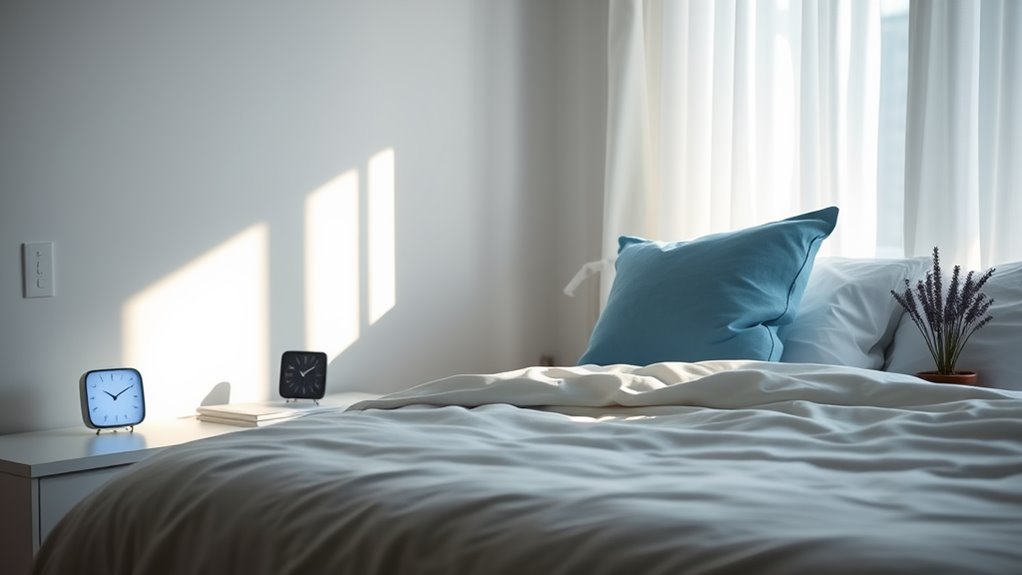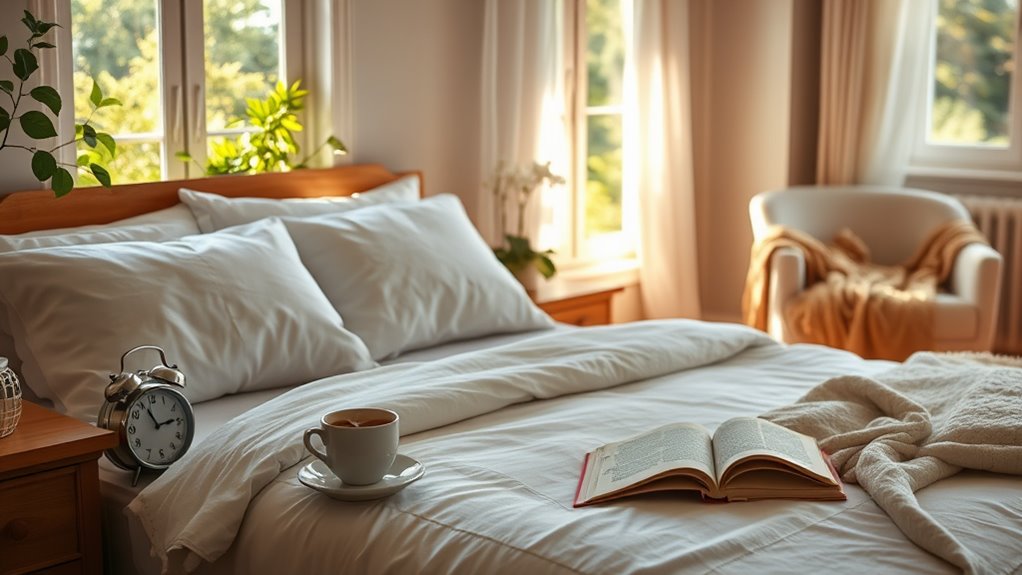Did you know that getting better sleep can seriously enhance your mood and memory? It's true! With just a few simple hacks, you can transform your nights and make mornings way more manageable. Think about establishing a consistent sleep schedule or creating a cozy bedtime routine. These small changes can lead to big improvements in how you feel and think. Curious about what else you can do to optimize your sleep? Let's investigate!
Establish a Consistent Sleep Schedule
Establishing a consistent sleep schedule is one of the easiest ways to improve your mood and memory. When you go to bed and wake up at the same time every day, your body gets used to it. This helps regulate your internal clock.
A consistent sleep schedule boosts your mood and memory by helping regulate your internal clock.
You'll feel more alert during the day and less groggy in the morning.
Try to stick to your schedule, even on weekends. It might seem tempting to sleep in, but it can throw you off. Aim for seven to nine hours of sleep each night.
Keep your sleep environment cozy and dark. You're creating a safe space for your mind to recharge.
With a bit of discipline, you'll notice a big increase in your mood and focus!
Create a Relaxing Bedtime Routine
After you've set a consistent sleep schedule, the next step is to create a relaxing bedtime routine. This helps signal your brain that it's time to wind down and prepare for sleep.
Here are some effective ways to do that:
- Limit Screen Time: Put away your phone or tablet at least 30 minutes before bed. The blue light can mess with your sleep hormones.
- Read a Book: Choose something light and enjoyable. It'll help distract your mind from the day's stresses.
- Take a Warm Bath: Relax your muscles and calm your mind with a soothing soak.
- Practice Deep Breathing: Spend a few minutes focusing on your breath. It's a great way to clear your thoughts and settle in for the night.
Implement these tips, and you'll be on your way to better sleep!
Optimize Your Sleep Environment

To catch those quality Z's, you need to make your sleep environment as inviting as possible. Start by ensuring your bedroom is cool, dark, and quiet. A comfortable mattress and pillows can work wonders, too. Let's break it down with this handy table:
| Element | Tips | Benefits |
|---|---|---|
| Lighting | Use blackout curtains | Reduces distractions |
| Temperature | Keep it around 60-67°F | Promotes restful sleep |
| Noise Control | Use white noise machines | Masks disruptive sounds |
| Aroma | Try lavender key oil | Encourages relaxation |
Limit Screen Time Before Bed
So, if you're scrolling through your phone or binge-watching your favorite show right before bed, you might be setting yourself up for a rough night.
Scrolling through your phone or binge-watching shows before bed can lead to a restless night.
Those screens emit blue light that can mess with your sleep hormones. Here's how to limit screen time and get better rest:
- Set a Curfew: Choose a specific time to put away screens, ideally an hour before bed.
- Create a Relaxing Routine: Swap screen time for calming activities, like reading or meditation.
- Use Night Mode: If you must use your devices, turn on night mode to reduce blue light exposure.
- Keep Devices Out of the Bedroom: Charge your phone in another room to avoid temptation.
Your sleep and mood will thank you!
Watch Your Diet and Caffeine Intake

Eating the right foods can be a game-changer for your sleep and general mood. When you're snacking, think wholesome! Focus on fruits, veggies, and whole grains. These goodies help your body feel balanced.
Avoid heavy meals close to bedtime—they can throw off your sleep cycle.
Now, let's chat caffeine. Sure, that morning coffee can be your best friend, but too much later in the day? Not so much! It can sneak into your evening routine and mess up your sleep. Aim to cut off caffeine by early afternoon.
Hydration's key too! Water helps keep your energy up without the jitters.
Exercise Regularly
If you're looking for a way to improve your mood and memory, exercise might just be your secret weapon!
Regular physical activity elevates endorphins, which can lift your spirits and sharpen your mind. You don't need to run a marathon; just a little movement can work wonders.
Here are some fun ways to get started:
- Walk or bike around your neighborhood.
- Try a dance class—you'll have a blast!
- Join a sports team—it's a great way to meet people.
- Do bodyweight exercises at home, like squats or push-ups.
Manage Stress and Anxiety

Managing stress and anxiety is crucial for keeping your mood and memory in check. When life feels overwhelming, take a step back.
Try deep breathing exercises or mindfulness techniques. Just a few minutes can help clear your mind. Break tasks into smaller steps, and tackle them one at a time. This can make everything feel more manageable.
Deep breathing and mindfulness can clear your mind; tackle tasks step by step for a more manageable day.
Don't forget to talk to someone you trust about what's bothering you. Sharing can lighten your load.
Establish a routine that includes relaxation time, too. Whether it's reading, listening to music, or just chilling out, it's significant to recharge.
Consider Natural Sleep Aids
Many people overlook natural sleep aids, but they can be game-changers for your rest.
If you're looking for a safer, supportive way to improve your sleep, consider these options:
- Melatonin: This hormone regulates your sleep-wake cycle. It's a great start to help you drift off.
- Chamomile Tea: Sip a warm cup before bed. It's calming and can help you relax.
- Lavender: Try using vital oils or a lavender pillow spray. The scent can soothe your mind.
- Valerian Root: This herb has been used for centuries to promote sleep. It might be just what you need!
Experiment with these natural aids, and you might find the restful sleep you've been craving!
Frequently Asked Questions
How Do Naps Affect Overall Sleep Quality?
Did you know that a 20-minute nap can improve alertness by up to 50%? Naps can elevate your total sleep quality, helping you feel more refreshed and focused, but too long might disrupt your nightly rest.
Can Sleep Position Influence Mood and Memory?
Yes, your sleep position can influence mood and memory. When you sleep on your side, it may promote better airflow and reduce snoring, which can lead to a more restful night and improved cognitive function.
What Are the Effects of Sleep Deprivation?
When you skimp on sleep, it's like wandering in a fog; your focus blurs, emotions spike, and memory falters. Prioritizing rest is crucial for clarity and emotional safety, keeping life's challenges manageable and clear.
How Does Age Impact Sleep Needs?
As you mature, your sleep needs often change. You might find you need less sleep in general, but the quality of your sleep can decline, leading to more frequent awakenings and lighter sleep patterns.
Are There Specific Sleep Disorders That Affect Mood?
Yes, certain sleep disorders, like insomnia and sleep apnea, can greatly affect your mood. When you don't get enough quality sleep, it's easy to feel irritable, anxious, or depressed, impacting your general well-being.









